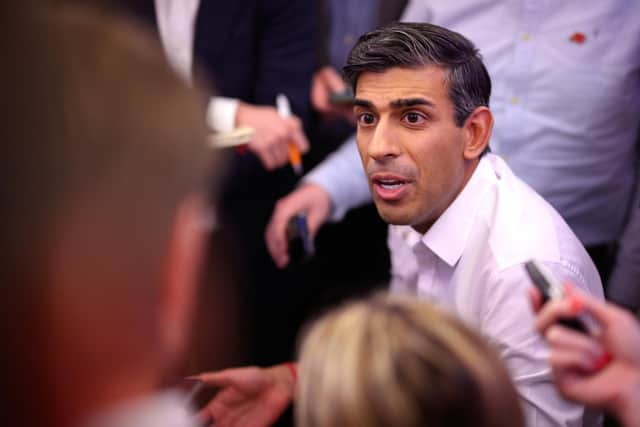Autumn statement: Rishi Sunak insists 'fairness' will be at heart of budget as Nicola Sturgeon shares ‘concern’
The Prime Minister defended his financial plans after a growing backlash to claims by Chancellor Jeremy Hunt that “we’re all going to be paying a bit more tax”.
Ms Sturgeon pounced upon the comments during a media appearance in Glasgow, saying she was “profoundly concerned” about the plans being considered by the Treasury.
Advertisement
Hide AdAdvertisement
Hide AdMr Hunt is looking to find £60 billion from a combination of hikes and spending cuts, with the Resolution Foundation calculating Ms Truss’s disastrous so-called mini-budget cost Britain £30bn.


Speaking in Bali, where he is attending the G20 summit, Mr Sunak told broadcasters he has already acknowledged Ms Truss made “mistakes”.
He said: “And what we’ve seen now is that stability has returned to the United Kingdom, but that’s because the expectation is that the Government will make those difficult, but necessary decisions to ensure that we can get a grip of inflation, reduce it for people with the cost of living, also limit the increase in mortgage rates.
“But I really want people to be reassured that what the Chancellor is working on is that all the decisions we make will have fairness and compassion at their heart and I’m confident on Thursday, people can see that that’s what we strive for.”
The Resolution Foundation has forecast Ms Truss’s remaining unfunded tax cuts, from national insurance and stamp duty cuts, cost nearly £20bn.
And the economists calculate that higher interest rates sparked by her economic vision have cost the nation a further £10bn, with higher costs of borrowing.
Some Conservatives have warned hiking taxes will not help grow the economy, with the UK teetering on the brink of recession after the economy contracted in the last quarter.
Kwasi Kwarteng, who was the chancellor who set out Ms Truss’s budget, argued growth would not stem from “putting up our taxes”.
Advertisement
Hide AdAdvertisement
Hide AdSpeaking to reporters on the plane to Indonesia, Mr Sunak said the plan was to “lay the foundations” for growth so taxes can be cut “over time”.
He said global challenges such as the coronavirus pandemic and the Russian invasion of Ukraine were the “primary driver for energy prices and inflation”.
The First Minister has now questioned the proposed plans being hinted at by Mr Hunt. She said: “I think the hints that have been given in public in the media, by the Chancellor, over the weekend should make everybody profoundly concerned.
“He’s talking about everybody having to pay more taxes, at a time when those at the lowest end of the income spectrum are already really struggling. If those tax increases fall there, that is of profound concern.”
Her assertion comes despite the Scottish Government setting income tax rates north of the border. Acting finance secretary John Swinney has hinted taxes could also be raised in Scotland from April next year.
Ms Sturgeon said the prospect of looming public sector cuts would cause “significant problems” for services that are “still recovering not just from Covid, but from the years of austerity that followed the last financial crash”.
She said: “The NHS is under more pressure right now than it has been probably at any time in its history and that pressure is only going to grow unless we see that significant injection of investment. So I really hope the Chancellor and the Prime Minister do the right thing later this week.”
The Prime Minister is at the G20 Summit in Indonesia this week, where he will call for co-ordinated global action to address the financial crisis, and discuss his five-point economic plan.
Advertisement
Hide AdAdvertisement
Hide AdThis includes direct government support to where it is most needed, ending the weaponisation of food production and distribution, strengthening energy security, helping developing countries grow financially and opening up global trade.
Comments
Want to join the conversation? Please or to comment on this article.
